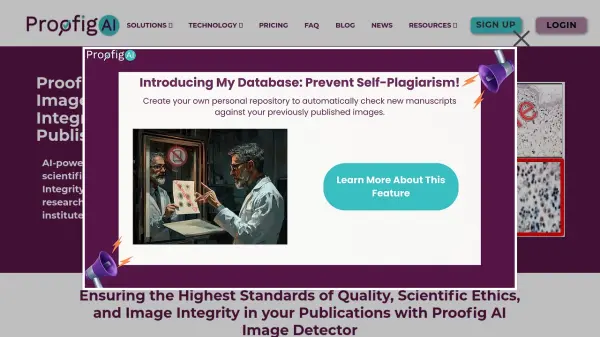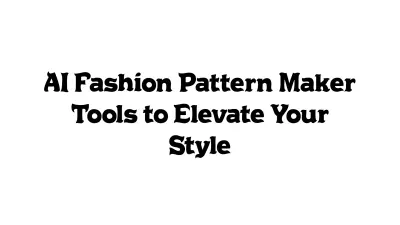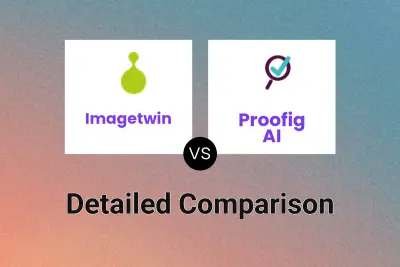What is Proofig AI?
Proofig AI is an advanced platform leveraging artificial intelligence and computer vision to uphold the integrity of scientific research images. It specializes in automatically detecting various forms of image manipulation, duplication, and plagiarism within scientific manuscripts, catering primarily to the life sciences. By offering a comprehensive suite of analytical tools, Proofig AI assists researchers, academic institutions, publishers, and ethics committees in maintaining the highest standards of quality and scientific ethics in publications, thereby safeguarding reputations and mitigating the risks associated with post-publication retractions.
The system operates by analyzing uploaded documents rapidly, providing detailed reports on potential image integrity issues in minutes. It can identify alterations such as cloning, editing, and splicing, as well as reuse of images through scaling, rotation, or flipping. Proofig AI also features plagiarism detection by comparing images against PubMed's vast database and can identify AI-generated microscopy images. The service ensures user data confidentiality by processing all analyses on private, secure servers and not using uploaded manuscripts for model training. This proactive approach to image screening helps save valuable time, reduce human error, and ensure the credibility of scientific findings before they reach peer review and publication.
Features
- Alteration & Manipulation Detection: Detects cloning, editing, deletion, and splicing within sub-images.
- Duplication & Reuse Detection: Identifies reuse of images within a single manuscript, including scaling, rotation, flipping, full and partial overlap, and other irregularities.
- PubMed Source Plagiarism Detection: Checks for reuse of sub-images from published manuscripts using PubMed's database of tens of millions of images.
- AI-Generated Image Detection: Identifies AI-generated microscopy images from widely used models, with continuous updates for new models.
- My Database Integration: Enables detection of self-plagiarism by comparing images with a personalized repository of prior research (available for enterprise licenses).
- Western Blot Analysis: Specifically detects alterations or manipulations in Western blot images, such as blot removal.
- Forensic Analysis Tools: Includes advanced tools for thorough forensic examination of images.
- Manual Page and Image Analysis Tools: Provides functionalities for detailed manual inspection of pages and images.
- Admin System Usage Module: Offers a robust admin system for enterprise-level control and monitoring of usage.
Use Cases
- Researchers ensuring image integrity before submitting manuscripts for publication.
- Research institutions maintaining high standards of publication quality and scientific ethics.
- Publishers screening submitted manuscripts for image-related issues prior to peer review.
- Ethics committees investigating allegations of scientific misconduct related to image data.
- Detecting plagiarism of images from previously published scientific literature.
- Identifying the use of AI-generated images in scientific research papers.
- Preventing self-plagiarism by checking against a researcher's own previously published images.
FAQs
-
What types of image issues can Proofig AI detect?
Proofig AI can detect alterations and manipulations (such as cloning, editing, deletion, and splicing), duplications and reuse (including scaling, rotation, flipping, and overlap), plagiarism by checking against PubMed's source database, and AI-generated microscopy images. -
How does Proofig AI ensure data privacy and security?
Proofig AI is trained using material developed in-house and open-source content designated for commercial use. User-uploaded manuscripts are not used to train the models; they are solely analyzed for image integrity issues and to generate reports. All analyses are conducted on private, secure servers, ensuring manuscripts and reports remain confidential. -
What types of image sources can Proofig AI analyze?
Proofig AI can auto-detect images from multiple sources, including various microscopies (confocal, light, fluorescence, electron), histology slides, pathology slides, Western blot bands, gel electrophoresis, flow cytometry (FC), fluorescence-activated cell sorting (FACS), cell culture, in-vitro, and in-vivo images. -
Who can benefit from using Proofig AI?
Proofig AI is beneficial for researchers, Principal Investigators (PIs), research institutions, publishers, and ethics committees looking to uphold research integrity and address scientific misconduct related to images. -
How quickly can Proofig AI analyze a scientific paper?
Proofig AI's SaaS platform allows users to upload documents for analysis and can provide a full report on image integrity within minutes.
Related Queries
Helpful for people in the following professions
Proofig AI Uptime Monitor
Average Uptime
99.86%
Average Response Time
146.87 ms
Featured Tools
Join Our Newsletter
Stay updated with the latest AI tools, news, and offers by subscribing to our weekly newsletter.












